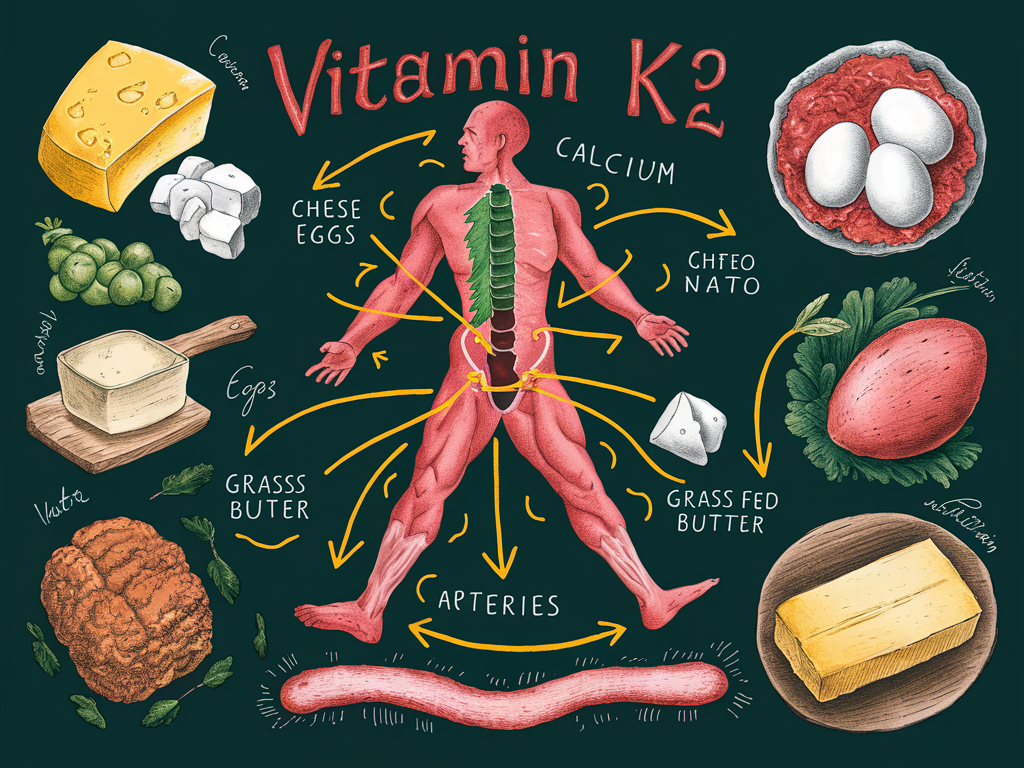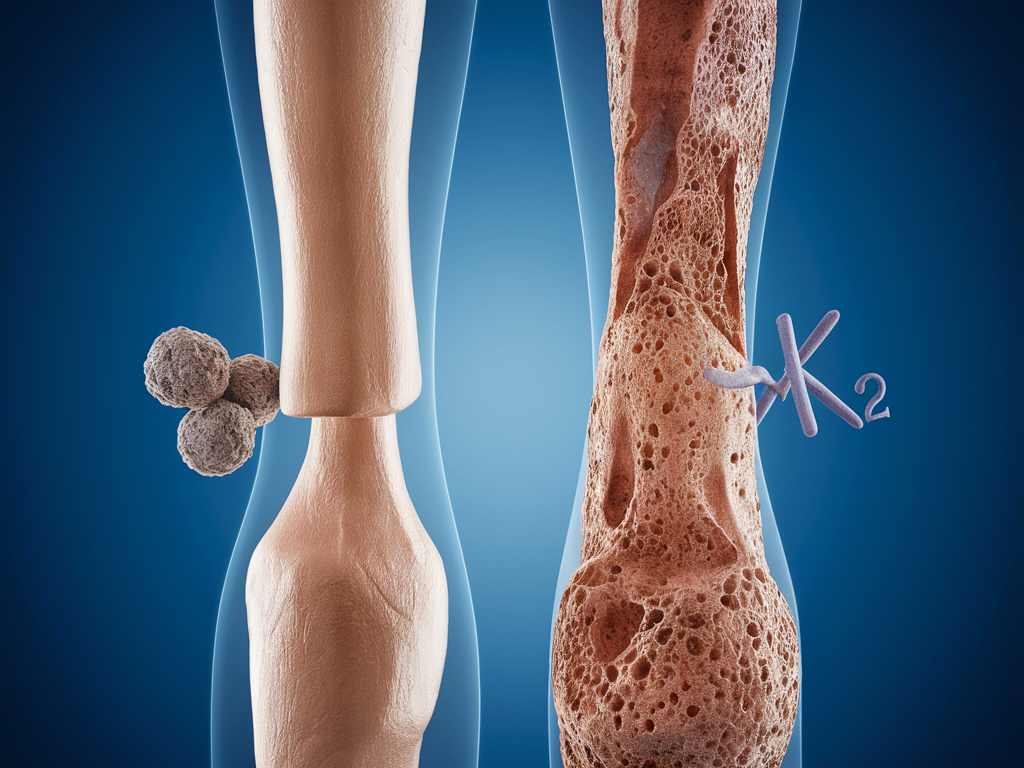Vitamin K2 is one of the most underappreciated nutrients in modern nutrition science, yet it plays crucial roles in numerous bodily functions. While most people have heard of vitamin K for its blood-clotting properties, many don’t realize that vitamin K2 offers distinct and powerful health benefits beyond coagulation. This essential fat-soluble vitamin works behind the scenes to ensure calcium goes where it should in your body, supporting everything from bone strength to cardiovascular health.
Vitamin K2, also known as menaquinone, belongs to the vitamin K family but functions quite differently from its better-known counterpart, vitamin K1 (phylloquinone). While K1 primarily supports blood clotting and is found abundantly in leafy greens, K2 plays a more diverse role in the body and comes from different dietary sources.
The primary sources of vitamin K2 include animal products like organ meats, egg yolks, and high-fat dairy from grass-fed animals. Fermented foods also provide excellent sources, particularly natto (fermented soybeans), which contains the highest concentration of K2 in the form of MK-7. Other fermented foods like cheese, sauerkraut, and certain pickled vegetables offer varying amounts of this vital nutrient.
Despite its importance, vitamin K2 remains overlooked in mainstream nutrition conversations. Many people consume adequate K1 through vegetables but may be deficient in K2, creating a silent nutritional gap that can affect long-term health. Understanding the specific benefits of K2 can help you make informed decisions about your diet and supplementation needs.

10 Essential Benefits of Vitamin K2
1. Promotes Proper Calcium Distribution
Perhaps the most remarkable function of vitamin K2 is its ability to regulate calcium metabolism in the body. It activates proteins that direct calcium to where it’s needed (primarily the bones and teeth) and prevents it from accumulating where it shouldn’t (arteries and soft tissues).
K2 activates two crucial proteins involved in this process: osteocalcin and Matrix Gla Protein (MGP). Osteocalcin, once activated by K2, binds calcium to the bone matrix, strengthening skeletal structure. Meanwhile, MGP prevents calcium from depositing in blood vessels, kidneys, and other soft tissues. Without sufficient K2, these proteins remain inactive, potentially leading to weakened bones and calcified arteries simultaneously—a phenomenon researchers call the “calcium paradox.”
2. Strengthens Bone Structure
Vitamin K2’s role in bone health extends beyond merely directing calcium to bones. Research shows it significantly increases bone mineral density and reduces fracture risk. Several clinical studies have demonstrated that K2 supplementation can slow bone loss and even increase bone strength in postmenopausal women.
K2 works synergistically with vitamin D for optimal bone health. While vitamin D helps with calcium absorption from the digestive tract, K2 ensures that calcium gets properly utilized in bone formation. This partnership highlights why both nutrients are critical for preventing osteoporosis and maintaining skeletal strength throughout life. Studies suggest that vitamin K2 may reduce fracture risk by up to 80% when consumed in adequate amounts.
3. Supports Cardiovascular Health
Heart disease remains the leading cause of death worldwide, and vitamin K2 may offer significant protection for your cardiovascular system. By preventing arterial calcification, K2 helps maintain arterial flexibility and health.
The Rotterdam Study, a large population-based research project, found that participants with the highest intake of vitamin K2 had a 57% lower risk of dying from heart disease compared to those with the lowest intake. This effect was not observed with vitamin K1 consumption, highlighting K2’s unique cardiovascular benefits.
By activating Matrix Gla Protein, K2 prevents calcium from hardening in arterial walls, maintaining proper blood flow and reducing the risk of hypertension and heart attack. This makes K2 one of the few nutrients that simultaneously strengthens bones while protecting the heart—a truly remarkable dual action.
4. Improves Dental Health
Just as K2 strengthens bones, it also plays a vital role in dental health. Teeth, like bones, require proper mineralization, and K2 helps direct calcium to strengthen tooth enamel and prevent decay.
Research suggests vitamin K2 can help reduce cavities by activating osteocalcin in teeth, similar to its action in bones. Traditional cultures with K2-rich diets typically displayed excellent dental health with proper jaw development and straight teeth. Dentist Weston A. Price observed this phenomenon in indigenous populations consuming traditional diets high in fat-soluble vitamins, including what we now know as vitamin K2.
For children, adequate K2 during development may support proper jaw and facial structure formation, potentially reducing the need for orthodontic interventions later in life.

5. May Help Combat Cancer
Emerging research suggests vitamin K2 may have anti-cancer properties. Several studies have shown that higher K2 intake is associated with reduced cancer risk, particularly for certain types like prostate, liver, and lung cancer.
The mechanisms behind K2’s potential cancer-fighting abilities include inducing apoptosis (programmed cell death) in cancer cells, suppressing cancer cell growth, and reducing the spread of cancer cells. A Japanese study found that women with the highest intake of natto (rich in vitamin K2) had a significantly lower risk of developing cancer compared to those who rarely consumed it.
While more research is needed before definitive claims can be made, the current evidence suggests that maintaining optimal K2 levels may be an important part of a comprehensive cancer prevention strategy.
6. Supports Skin Health
The health benefits of vitamin K2 extend to your skin as well. K2 plays a role in preventing wrinkles and maintaining skin elasticity by influencing calcium metabolism and potentially supporting elastic fiber formation.
Vitamin K2 may help certain skin conditions through its anti-inflammatory properties. It also supports the production of Matrix Gla Protein in the skin, which helps prevent calcification and maintains proper extracellular matrix structure.
Additionally, some research suggests K2 supports collagen production—the protein responsible for skin’s structure and firmness. While more studies are needed, preliminary evidence indicates that adequate K2 levels may contribute to healthier, more youthful-looking skin.
7. Enhances Brain Function
The brain is another organ that appears to benefit from vitamin K2. Emerging research indicates K2 may play a role in cognitive health and protecting against neurodegeneration.
Vitamin K2 is involved in the synthesis of sphingolipids, fat molecules crucial for brain cell structure and signaling. It also helps protect the brain from oxidative stress and inflammation, two factors implicated in cognitive decline and neurodegenerative diseases.
Some studies suggest that higher vitamin K intake is associated with better memory performance in older adults. While research in this area is still developing, maintaining adequate K2 levels appears beneficial for preserving cognitive function as we age.
8. Improves Insulin Sensitivity
Vitamin K2 may offer benefits for metabolic health, particularly regarding glucose metabolism and insulin sensitivity. Research suggests K2 may help regulate glucose metabolism and improve insulin sensitivity, which could be valuable for diabetes prevention and management.
Studies indicate that vitamin K2 activates osteocalcin, which not only helps with bone formation but also stimulates insulin production and sensitivity. In animal studies, vitamin K2 supplementation improved insulin sensitivity and glucose tolerance.
These findings suggest that adequate vitamin K2 levels may help protect against type 2 diabetes and metabolic syndrome, although more human clinical trials are needed to fully understand this relationship.
9. Boosts Immune System Function
Vitamin K2 appears to support immune function through several mechanisms. Its anti-inflammatory properties help regulate immune responses and may reduce chronic inflammation, a factor in many diseases.
Research suggests K2 influences the production of certain immune cells and signaling molecules, potentially enhancing the body’s ability to fight infections. Some studies indicate that vitamin K deficiency is associated with increased inflammatory markers and reduced immune function.
While K2’s immune-supporting properties are still being investigated, maintaining optimal levels through diet or supplementation may contribute to overall immune system health and resilience against various pathogens.

10. Works Synergistically With Other Nutrients
Vitamin K2 doesn’t work in isolation—it functions as part of a complex network of nutrients that support each other. Understanding these relationships can help you optimize your nutrient intake for maximum benefits.
The relationship between vitamins A, D, and K2 is particularly important. These fat-soluble vitamins work together in numerous biological processes. Vitamin D increases the production of vitamin K-dependent proteins, which then require vitamin K2 for activation. Without sufficient K2, these proteins remain inactive, potentially limiting vitamin D’s benefits.
Magnesium also plays a critical role in K2 function, as it’s required for vitamin K2-dependent enzymes to work properly. Additionally, calcium and zinc interact with K2 in various ways, highlighting the importance of a balanced, nutrient-dense diet rather than isolated supplementation.
Conclusion: Incorporating Vitamin K2 Into Your Health Regimen
The research surrounding vitamin K2 continues to grow, revealing its importance for numerous aspects of health beyond blood clotting. From strengthening bones and protecting the heart to potentially supporting brain function and cancer prevention, K2 deserves recognition as an essential nutrient.
To incorporate more K2 into your diet, focus on traditional foods like grass-fed animal products, organ meats, high-fat dairy, and fermented foods like natto, cheese, and sauerkraut. For those considering supplementation, K2 comes in several forms, with MK-4 and MK-7 being the most common. MK-7 typically offers better bioavailability and longer-lasting effects.
As with any supplement, it’s advisable to consult with a healthcare provider before starting vitamin K2, especially if you’re taking medications like blood thinners that may interact with vitamin K. For most healthy individuals, however, optimizing vitamin K2 intake represents a simple yet powerful strategy for supporting long-term health and preventing chronic disease.
In a world where nutrient deficiencies often occur despite caloric abundance, understanding the critical role of vitamin K2 provides an opportunity to address a common nutritional gap and potentially improve multiple aspects of health simultaneously.

